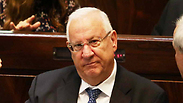
Rivlin slams Foreign Ministry for fueling crisis with New Zealand
Foreign Ministry vetoed New Zealand's new ambassador to Israel because he was supposed to represent the Palestinian Authority too, angering President Rivlin.
President Reuven Rivlin is scheduled Thursday to receive the letters of accreditation of the new ambassadors who have been sent to here to represent their respective countries. The event will be Rivlin's first diplomatic ceremony as Israel's president, a particularly festive occasion.
The president, however, is fuming, and has slammed the Foreign Ministry for its decision to prevent the New Zealand ambassador from submitting his papers and thereby fueling a crisis in the relations with a government that is one of Israel's closest friends around the world.
The issue is a particularly charged one as New Zealand is currently a candidate for non-permanent membership of the UN Security Council.
New Zealand, with its limited resources, operates just two embassies in the region – in Ankara and in Cairo. The ambassador stationed in Turkey also functions as a non-resident ambassador in Israel, and members of the embassy visit Israel once every few weeks, representing their country in dealings with both Jerusalem and with the Palestinian Authority.
The Foreign Ministry is unhappy with the dual representation, with ministry officials expressing concern that foreign states could thus equate the status of the PA with that of Israel. They don't like it, but have turned a blind eye to it: New Zealand's previous two ambassadors moved openly between Jerusalem and Ramallah, and even publicized the fact on their embassy Web site – and everyone was happy.
Newly appointed New Zealand Ambassador Jonathan Curr's only sin is that he sent a letter to the Foreign Ministry informing officials there of his intention to also visit Ramallah. One of the junior officials duly passed on the information to his superiors; they in turn kept the ball rolling and informed the political echelon, which then instructed the Foreign Ministry officials to sanction New Zealand.
New Zealand was both surprised and offended. "Historically the case has been whoever we accredited for Israel we also accredited for Palestine," commented New Zealand Prime Minister John Key. "It would be obviously inconvenient for us if we couldn't do that."
Key's government opted not to give in to the dictate, and instructed the ambassador to remain in Ankara for now.
Rivlin cannot force Foreign Minister Avigdor Lieberman to change the decision; he doesn't have the authority to do so. All he can do is voice his protest.
And he knows New Zealand well and cherishes its friendship: As Knesset speaker, he visited there more than eight years ago. The trip heralded the rehabilitation of the ties between the two countries after Mossad agents were accused of forging New Zealand passports. Rivlin reopened the Israeli Embassy there.
Israel's policies with regard to foreign representations are filled with contradictions. On the one hand, Israel accepts the fact that the world refuses to officially recognize Israel's sovereignty over Jerusalem, including the western half of the city, or Jerusalem as Israel's capital.
Aside from a handful of exceptions, foreign embassies in Israel are located in Tel Aviv. On the other hand, Israel endeavors to convince the world that Jerusalem is the capital of Palestine. The United States, Britain, France and several other foreign countries have consuls in Jerusalem who are accredited to the PA alone. The Foreign Ministry encourages this division.
The story of the ambassador's blacklisting received wide coverage in New Zealand. There was no comment from the New Zealand Embassy in Turkey. Foreign Ministry Spokesman Emmanuel Nahshon told me Tuesday that the decision was "the implementation of guidelines well known to the diplomatic community in Israel."










